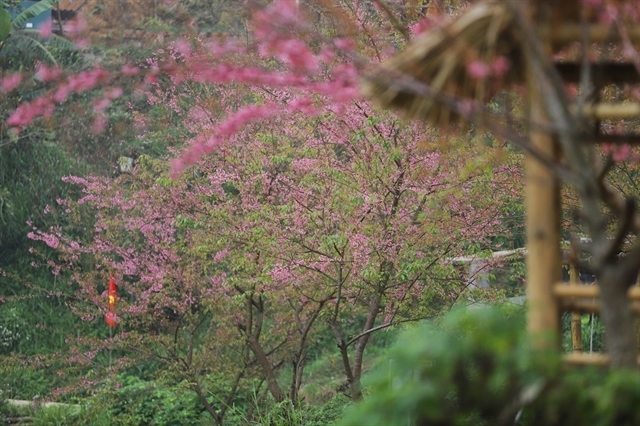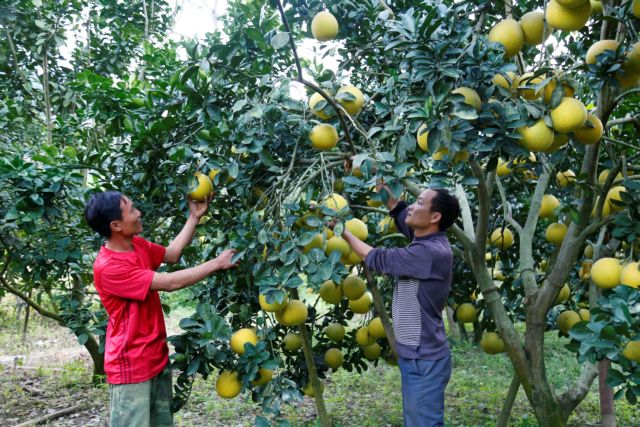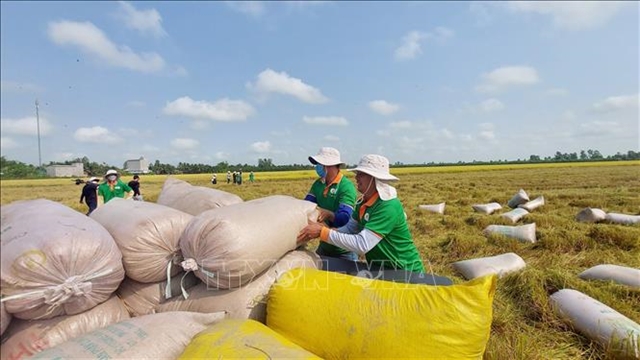 Features
Features

The 37-year-old villager from the Dao ethnic group in Lục Mùn Village, who is also an active and enthusiastic secretary of the village’s Party Committee, has helped improve local living conditions by drawing on his agricultural experience to teach local people to farm smarter.

|
| NATURE'S BOUNTY: Lý Văn Đăng (right), 37, in his grapefruit garden. The farmer from the Dao ethnic group in Lục Mùn Village, Tuyên Quang Province has helped improve local living conditions by drawing on his agricultural experience to teach local people to farm smarter. VNA/VNS Photos Nam Sương |
By Nam Sương Phương
Lý Văn Đăng, an ethnic minority man from the northern mountainous province of Tuyên Quang’s Yên Sơn District, is a veritable local hero.
The 37-year-old farmer from the Dao ethnic group in Lục Mùn Village, who is also an active and enthusiastic secretary of the village’s Party Committee, has helped improve local living conditions by drawing on his agricultural experience to teach local people to farm smarter.
A father of two children, Đăng said he set a goal to earn as much as possible to support his family.
After Đăng's family was given about 4ha of land for farming following a decision issued by the provincial authority in 2010 to allot land to local ethnic minority people, his life has changed dramatically for the better.
How did he do it?
First, he decided to learn through books and from successful farmers about new agricultural production models.
Growing rice and other traditional crops such as cassava or maize were his first priorities as he thought the experience inherited from elder generations would help him overcome obstacles.
Things didn't turn out quite like that.
“To get high yields from the harvest was not really easy without new and modern agricultural techniques,” Đăng said.
He faced failure again and again until he learned he should grow more fruit and other crops besides rice, cassava and maize.
He also decided to apply more what he had learned from training courses held by communal agriculture authorities.
Grapefruit and custard apple were his first new choices.
After more than five years growing such fruits among other crops, at present, Đăng's family has more than 500 grapefruit and 700 custard apple trees, and nearly 1ha of arrowroot.
The family can earn more than VNĐ300 million (US$13,000) a year from their land, a high income for a household in his district.
Thanks to his experience, his family's orchards always give a stable harvest, thus giving them a stable income.
Đăng said his family built a three-storey house at the end of 2018 with the money earned from the fruit gardens.
As well as making his family better off, Đăng also helps and creates jobs for many poor labourers in the village.
He is happy to support many other households in the village and other areas in the commune to escape poverty by sharing his gardening and business know-how through meetings and training classes.
Đăng also bought a truck to help his neighbours transport their products to markets during harvest seasons.
Trần Văn Quyền, a member of the Party Committee of the same Lục Mùn Village, said although he was a young Party member, Đăng always sets a good example in all aspects of Party work, particularly in sharing experience to other farmers to enrich their life.
Thanks to Đăng’s support, Quyền said he had planted more than 300 grapefruit and 500 custard apple trees on an area of 3ha which could bring him an annual income of more than VNĐ200 million.
“From a poor household in the village, my family has now eradicated poverty to own a two-storey house and two motorbikes,” said Quyền.
Trần Văn Thọ, deputy secretary of the Phúc Ninh Commune’s Party Committee said Đăng had made a great contribution to poverty reduction in the village and the commune. He had won trust from all local people and authorities.
Lục Mùn Village has a total of 106 households, of which 75 are ethnic Dao, who used to be very poor, but that's changing thanks to people like Đăng.
The village still has 10 poor households and the Party Committee has vowed to help them escape poverty this year with a boost of socio-economic development through agriculture and a plan to build new rural areas in the near future.
Having adequate land and water for sustainable agricultural production is one of the key targets of Tuyên Quang Province’s special policy on socio-economic development for ethnic minorities and mountainous regions in 2020.
Ethnic people account for nearly 54 per cent of the province’s population. The province is working to reduce the poverty rate among the ethnic minorities to 4 per cent this year, assisting nearly 2,000 families with more than 355ha of farm land, and 760 others with over 24ha of residential land, supporting job shifting for 5,700 families and providing safe water for 15,600 others. VNS




